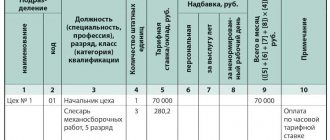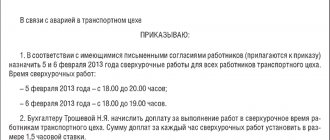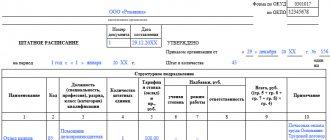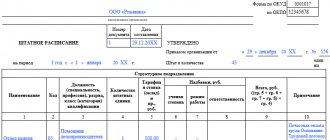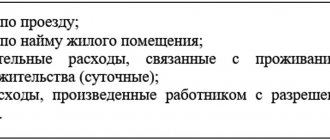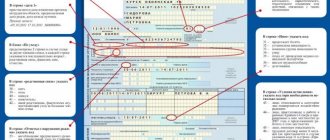Shift work schedules often include night work. For the employee, such work carries an increased burden, therefore, the payment for it should be higher. Employees are often concerned about the issue of pay during shift work, in particular when they are busy at night.
Let's consider how the laws of the Russian Federation relate to this issue, how accounting occurs when working outside of normal hours, how to calculate payment, and we will show this with a specific example.
How to establish shift work in an organization ?
Legislation on night allowances
According to Art. 154 of the Labor Code of the Russian Federation, a person who works at night must receive additional money for each hour he works. This norm specifies Government Resolution No. 554 of July 22, 2008, which prescribes a minimum additional payment to the hourly rate or to the hourly rate of salary - 20%.
This limit represents a lower threshold, while an upper one is not established. If the employer intends to make the amount of the surcharge exceeding 20%, then he is obliged to reflect it in one of the following documents:
- Collective agreement.
- Fixed-term (indefinite) employment contract.
- Regulatory document of a specific enterprise.
There is a contingent of workers for whom the law specifies a percentage of “night” surcharges that exceeds 20%.
Pay for night work
Each organization, based on its capabilities and interests, has the right to determine how to pay for night hours if the additional payment exceeds the 20 percent minimum guaranteed by labor legislation. The basis for this may be an internal document of the enterprise (regulations, collective agreement, employment contracts of employees). Payment for night hours according to the Labor Code of the Russian Federation is calculated taking into account the cost of an hour of work of an employee (tariff, salary) without taking into account other allowances and additional payments. The employer, however, is not tied to this calculation procedure and can establish it in a different form and amount, but only if the legally established level is exceeded.
For some professional categories of workers, additional pay for night shifts is established by special regulations of departments or government orders in an amount exceeding the minimum amount of such remuneration.
Thus, for employees of medical institutions, such additional payment is 50% of the hourly salary. And employees of the paramilitary, fire protection and penitentiary systems are entitled to 35% of the specified salary.
Additional payments to guards for overtime work
Article 154 of the Labor Code of the Russian Federation does not have exceptions for the obligations of managers regarding bonuses to workers who, based on the nature of their activities, are hired specifically to work at night. As can be seen from the table above, watchmen (security guards) are paid an additional fee for night work, which cannot be less than 35% of the salary (tariff paid for 1 hour).
It is not possible to include an allowance in a watchman's salary. This follows from the instructions of Art. 154 of the Labor Code states that upon admission to a position, the previously mentioned documents must necessarily indicate the exact indicator of the increase in pay for night work. Therefore, when this bonus “sits” in the watchman’s salary, it cannot be specified.
Additional pay must be increased for each hour worked at night, and the number of such hours will be different for each month. The salary is set as a specific amount, which does not allow the monthly difference to be taken into account in full.
Calculation example
Let's look at how night shifts are paid according to the Labor Code, using the example of an organization that has a legally established additional payment amount of 20% of the hourly rate (salary).
1. A watchman at the Romashka organization worked 8 daily shifts (192 hours) in a month. His tariff rate is set at 45 rubles per hour. Of the 192 hours worked by a guard, 64 are night shifts.
The calculation of the surcharge in this case will look like this: 45x0.2x64=576 rubles.
The resulting figure is summed up with other types of accruals due to the watchman for the period worked.
2. A process engineer from the same organization has a salary of 8,000 rubles per month.
The monthly standard of hours was 176. By order of management, he was involved in work from 24 hours to 8 am. Of this time, the night period accounts for 6 hours.
The calculation will be like this:
8000/176=45.45 rub. — hourly salary of a process engineer in a given month.
45.45x0.2x6=54.54 rub. - additional payment received.
When calculating wages, this amount is also added to all types of accruals due to the employee for the month.
Supplements on holidays and weekends
Art. 153 of the Labor Code prescribes that for activities carried out on holidays, salaried employees must pay:
- no less than 1 higher than the salary rate (daily, hourly), when the work fits into the monthly standard;
- at least 2, if the standard time per month allotted by law for work was exceeded.
When night work occurs on a holiday, management must give double guarantees of payment. Namely:
- twenty percent minimum surcharge;
- double or triple payment (depending on meeting or exceeding work standards).
The basis for calculating the twenty percent increase is the regular salary, and not the salary that provides for increased rates. When night workers are required to work on weekends and holidays, the two compensations due to them must be summed up.
Night on a business trip
If an employee must work at night while on a business trip, this does not change the mandatory additional payment. The only difference is that the employer is not obliged to pay extra for night hours spent on the way to the business trip, although he can do this on his own initiative and desire.
How is a flight paid at night if an employee returns from a business trip on a day off and the flight is partially carried out at night?
What if it's overtime?
It’s one thing when night hours are included in the work schedule, and a slightly different situation when they end up being worked beyond the norm, even with a shift schedule. How to make payment in such cases?
It is necessary to apply both the extra pay per night and the overtime factor, which is 1.5 for the first two hours of overtime and 2 for the subsequent time.
How to reflect additional payments for night time in the staffing table
The staffing table is drawn up in accordance with the T-3 form, which provides columns six to eight inclusive - “Allowances”. In accordance with the filling procedure, they indicate payments related to compensation and incentives. This:
- Awards.
- Allowances.
- Additional payments.
- Incentives.
Such payments may be:
- specified by law (allowances for academic degrees, for work in the northern regions);
- appointed by the head of the company (due to certain conditions or a special schedule).
According to Art. 149 of the Labor Code, night activities require payments, but not bonuses. The legislation considers “night” additional payments along with the payment of overtime, days off, and part-time pay, which it does not classify as allowances. And they are not provided for in the staffing table.
Article 154 also does not characterize increased pay for night work as an allowance, like the government decree mentioned above. However, Article 129, which deciphers the concepts of payments related to compensation, says that they include, in particular, additional payments and allowances for work in conditions that do not correspond to the norm.
Working at night may be considered deviant. From this it follows that their payment, recorded in the staffing table as a type of allowance, does not conflict with the law.
You can also apply different logic than the one outlined. It follows from it that since the staffing table is a local regulatory act, and increased payments for night hours, according to Article 154 of the Labor Code, can be indicated in such documents, a special article can be included in it, for example, “night extra payments.”
Who should not work at night?
According to labor legislation, not all people are allowed to work from 10 pm to 6 am.
You cannot work at night:
- pregnant women;
- employees under 18 years of age (with the exception of representatives of creative professions in some cases);
- women with children under three years of age;
- single parents with children under five years of age (both mothers and fathers);
- disabled people
The last three categories of persons can be involved in the relevant employment only with their written consent. In this case, the employer must fulfill an important duty: to familiarize these employees with their right to refuse (in writing). And, of course, payment for night hours is made according to the Labor Code of the Russian Federation if agreed. There is no legally developed form for familiarizing an employee with his rights and giving consent to work, so it is considered quite acceptable to simply write “agree/disagree” on the order.
Reflection of night hours in the time sheet
The time sheet is kept according to the T-12 form - manually, T-13 automatically. The instructions for filling it out require you to indicate the hours worked day and night. Hours related to night work are reflected in column 29. Column 31 shows the number of night shifts per month.
When work begins at night and ends in the morning (or vice versa), the number of hours is indicated by a fraction. Another option can be provided: add an additional line to the timesheet. Conventions regarding day and night hours:
| Opening hours | Documents on the basis of which you can make appropriate notes on the report card | Cipher | |
| Letter | Number | ||
| Daytime | Confirmation of hours worked by management Pass service mark Other | I | 01 |
| Night | Same | N | 02 |
All night hours noted on the timesheet are summed up at the end of the month. Activities that take place at night are documented in accordance with the forms established in a particular company.
Which shifts are considered night shifts?
The law declares night work hours to be from 10 p.m. (10 p.m.) to 6 a.m.
A shift will be considered a night shift if at least half of it consists of work within the specified time period. Payment at the night rate will be only for the hours that make up this period; the rest will be rewarded, as is customary in day shifts. The definition of “night shift” in this case is significant for deciding the issue of attracting or not attracting a certain category of employees.
ATTENTION! According to Art. 96 of the Labor Code of the Russian Federation, the night shift should be 1 hour shorter than the corresponding day shift.
The night shift is not reduced by an hour in certain special cases, namely:
- the employee was specifically hired for night work, and this is reflected in the employment contract;
- the employee has a reduced schedule;
- The shift schedule is based on a 6:1 scheme;
- when the shift cannot be shortened due to the nature of production.
Question: How to pay for overtime work at night when recording working hours with a long accounting period (for example, a quarter)? View answer
Night hours during a business trip
There are options when a seconded employee is forced to perform his duties at night. For the travel time of TC in st. 167 guarantees the accrual of average earnings. The code does not comment on combining it with night activities. It is advisable to refer to the current document of the Soviet period - the joint instruction of the Ministry of Finance and the State Committee for Labor of the USSR, All-Union Central Council of Trade Unions dated 04/07/1998 No. 62 “On official business trips within the USSR.”
This document states that if a representative of an organization is sent on a business trip specifically to complete it on weekends or holidays, then they must be paid in an increased amount. Art. 149 of the Labor Code, among the conditions that differ from the norm, considers night work and work on weekends and holidays. If we take into account this fact and the logic of the specified instructions, we can come to the conclusion that when working at night during business trips, the employer must make an additional payment.
For this purpose, the traveler must submit a document indicating the fact of night work and the number of hours worked. It can be issued by the organization where the employee was sent. It would be logical to calculate the additional payment, taking into account the average earnings. Due to the fact that there is no clear legislative framework on this matter, the issue of additional payment for hours worked at night on a business trip is debatable.
Special contingent of personnel
Certain categories of employees do not have the right to work night shifts, without taking into account their opinion on this matter. Another list defines the circle of workers who can be involved in night work if they express their consent.
It is prohibited to work at night:
- women expecting a baby;
- minor workers, except for special categories provided for by the Labor Code of the Russian Federation and certain federal laws, for example, those involved in performances or other events.
You can work at night with written consent:
- mothers of young children (under 3 years old);
- disabled people of any group;
- employees who care for disabled people;
- workers caring for unhealthy family members (according to medical opinions);
- single parents with children under 5 years of age;
- guardians of children under 5 years of age.
FOR YOUR INFORMATION! An employee belonging to this category must be warned in writing that he has the right to refuse to work at night, and in turn, have his consent endorsed.
Compensation calculated based on piecework
When work is subject to piecework payment, the bonus for night working hours is calculated based on the rate established for the piecework worker. To calculate the amount to be paid, you need to multiply the following indicators:
- Number of hours worked at night.
- Piece rate for one hour.
- A supplement expressed as a percentage of the hourly rate.
Example 2. Tensor LLC determined a piece rate payment for the manufacture of one product - 10 rubles. For a month, turner Akimov Yu.G. turned 1200 items, working 5 hours at night. His hourly tariff rate is 50 rubles/hour. According to the regulations on remuneration at Tensor LLC, the additional payment for night work is 40% of the hourly rate.
Main part of salary:
- 10 rub./pcs. x 1200 = 12,000 rub.
- 5 hours x 50 rub./hour x 40% = 100 rub.
Total amount for the month:
- 12000 rub. + 100 rub. = 12100 rub.
How do you pay?
Most often, the need to pay for night time occurs in enterprises with a shift work schedule.
In this case, the working time of individual employees partially or completely falls on the period from 22 to 6 hours, so they are entitled to additional payment for these hours.
It is calculated depending on how the work is paid: based on the time actually worked or at established tariff rates. In this case, the employee receives money for regular working hours and for night work, taking into account the required additional payment.
An example of calculating payment on regular days
The Atlant LLC enterprise has an eight-hour working day and a three-shift work schedule:
- 1st shift – from 7.00 to 15.00;
- 2nd shift – from 15.00 to 23.00;
- 3rd shift – from 23.00 to 7.00.
The tariff rate for one hour of work is 50 rubles/hour, the surcharge for night time established in the collective agreement is 20%.
Enterprise employee V.D. Pilipov in February 2021 worked 168 working hours, of which:
- 1st shift – 64 hours;
- 2nd shift – 48 hours (of which 6 are night shifts, from 22.00 to 23.00);
- 3rd shift – 56 hours (49 of them are night shifts, from 23.00 to 6.00).
The employee's final salary will be:
Salary = 64 * 50 + 42 * 50 + 6 * 50 * 1.2 + 7 * 50 + 49 * 50 * 1.2 = 8950 rub.
For comparison, you can calculate the salary that an employee would receive if he worked only the first shift:
Salary = 168 * 50 = 8400 rub.
It turns out that the monthly supplement for night work is 550 rubles. (8950 – 8400 rub.).
A special procedure for calculating wages in situations where night work coincides with a non-working holiday.
According to general rules, work on holidays is paid at least double the amount.
If an employee works at night on a holiday, he has the right to receive the following additional payments:
- minimum 20% of the rate for each hour of work at night;
- double pay for all working hours on a holiday.
An example of calculating payment on holidays
Calculations can be considered using the previous example, setting the additional payment to the employee for 02/23/2016. Let's say that on this day he worked the second shift - in this case, the number of night hours is equal to one. The collective agreement establishes double pay for work on a holiday.
The employee is entitled to:
Salary = 1 * 1.2 * 2 * 50 + 7 * 2 * 50 = 820 rub.
At normal rates, his daily earnings would be 400 rubles. (50 * 8), if paid on a regular day - 410 rubles. Obviously, for a holiday the overpayment is quite significant.
An example of calculating payment for a piecework system
The remuneration of piece workers also has some peculiarities. Most often, they set an additional payment to the piece rate.
Employee Kurbatov Yu.V. receives 80 rubles for each unit of manufactured products. The production rate is 2 units/hour. In March the employee worked:
- 150 daytime hours;
- 18 night hours.
It turns out that 36 products (2 * 18) were made at night, and 300 products (150 * 2) during the daytime.
Supplement for night work is 20%. The final salary will be:
Salary = 300 * 80 + 36 * 80 * 1.2 = 27,456 rubles.
Difficulties in establishing additional payments to piece workers may arise if the products produced are manufactured over a long period of time.
For example, an employee may start making a product at night and finish it during the day, so it will not be possible to set the amount of additional payment for this. In this case, the calculations will need to be done a little differently.
Kalinin M.P. receives 5 thousand rubles for each assembled computer. In March 2021, he assembled 7 computers, while the amount of time he worked was 176 hours, namely:
- during the day – 128 hours;
- at night – 48 hours.
The additional payment for night time in accordance with the employee’s employment contract is 25%.
He should be credited 35 thousand rubles. (5000 * 7). The surcharge for night time will be:
Additional = 7 * 5000 / 178 * 48 * 25% = 2360 rub.
The final salary will be:
Salary = 35,000 + 2360 = 37,360 rubles.
The employer is obliged to keep records of all night hours of the employee and make additional payments for them. In case of violation of this requirement, employees have the right to contact the labor inspectorate with a complaint against the manager for incomplete payment for their work.
The rules for issuing a child tax credit in 2021 have changed slightly compared to 2015. You don’t receive your legal salary and your employer feeds you “breakfast” all the time? Find out what to do in this case by reading our article.
How does a nominal salary differ from a real one? The differences are described in detail here.
Supplements for shift work
When an enterprise establishes a shift schedule consisting of two, three or four shifts, then those of them that completely or partially coincide with the time period lasting from 10 pm to 6 am are accepted as night shifts. Although the Labor Code of the Russian Federation does not oblige company managers to make additional payments for all night shifts, this is again assigned to them by the “Soviet” circular. This is Resolution of the Central Committee of the CPSU, the Council of Ministers of the USSR and the All-Russian Central Council of Trade Unions dated February 12, 1987 No. 194.
It, in paragraph 9, states that the right to additional payment when organizing a work schedule that involves several shifts for each hour of work is granted to categories of workers whose area of activity is:
- Construction.
- Industrial enterprises.
- Communication organizations.
- Transport industry.
- Agro-industrial complex.
When working the night shift, they are entitled to an additional 40% of their salary (tariff). But only when night work accounts for at least 50% of the time. But paragraph 9 of the resolution was considered unenforceable by the decision of the Supreme Court of the Russian Federation dated May 21, 2002 No. GKPI2002-353. However, the Presidium of the RF Armed Forces in 2003, in turn, overturned this decision (in part, paragraph 9) by Determination No. 48pv-03.
Thus, paragraph 9 of Resolution No. 194 is still in effect today. At the same time, the Supreme Court proceeded from a broad interpretation of the scope of application of this norm. But some employers may refer to the fact that their enterprises belong to other industries not specified in Resolution No. 194, and not make additional payments. It follows from this that there is a gap in labor law, which makes the interests of persons working several shifts at night unprotected.
Increased surcharges
Increased amounts of additional payments for night work can be established in industry agreements. For commercial organizations, such agreements are mandatory only if they join them (Article 48 of the Labor Code of the Russian Federation). For example, according to the industry agreement for employees working in the oil and gas industry, additional payments for night shift work should be 40 percent of the hourly rate or salary (clause 3.6 of the Industry Agreement dated December 13, 2013). This agreement is binding only for those organizations that have joined it (clause 1.3 of the Industry Agreement dated December 13, 2013). At the same time, organizations in the oil and gas industry are considered to have acceded to the agreement if, within 30 calendar days from the date of official publication of the relevant proposal, they have not sent a reasoned refusal to accede to the agreement to the Ministry of Labor of Russia (letter of the Ministry of Health and Social Development of Russia dated March 29, 2011 No. 22-5/10/ 2-3015).
Who is not allowed to work at night?
Many managers strive to organize continuous work activity at the enterprise, since a lot can depend on this not only for the organization itself, but also for the users of their products or services.
When an organization immediately switches to a 24-hour work schedule, the employer, together with the trade union, develops a work schedule, which should take into account not only work efficiency, but also take into account the infliction of any moral and physical harm to employees. This is expressed in establishing the maximum duration of night shifts in a row, the total time of their duration, as well as the necessary breaks in work.
Employees of the organization must have the opportunity to carry out work not only at night, but also during the day, with the exception of cases of hiring an employee at night.
The employer is obliged to warn the team of employees about changes in the procedure for carrying out work one calendar month before the actual changes, otherwise such behavior will be considered a violation of current labor legislation while respecting the rights of the employee.
The following persons cannot be admitted to the labor process at night:
- Pregnant women who have confirmed their condition with a medical certificate.
- For minors, an exceptional case is work for the development of cinematography, theatrical skills and any other creative professions.
- Employees of the enterprise who, due to health reasons, are unable to perform their duties at such times.
The legislation establishes certain categories of the working population who can carry out activities at their own request and with the provision of a document confirming it - an application.
These categories of employees include the following persons:
- women who have a dependent child aged zero to three years;
- disabled people for whom working at a given time of day will not cause harm to their health;
- employees of the organization who support disabled children;
- workers who, in addition to their work duties, care for sick family members;
- parents and guardians of children under five years of age, if they carry out educational functions alone without a second spouse or guardian.
At the same time, it is established that the application for consent to work must be accompanied by a medical certificate confirming the state of health and the absence of contraindications for night work. The employer is obliged to notify these employees that they have the opportunity to refuse to perform work without any sanctions from management.
A disabled employee who wishes to work under such conditions must provide an extract or opinion from the attending physician or medical commission on the possibility of working at a given time of day and the absence of contraindications for such work.

